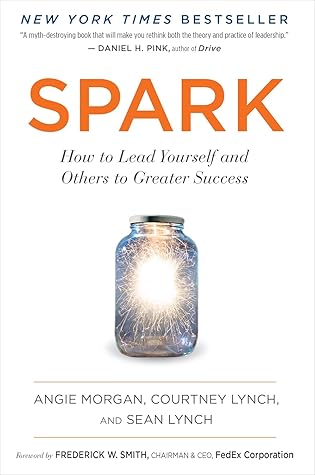More on this book
Community
Kindle Notes & Highlights
by
Angie Morgan
Read between
February 20 - April 4, 2020
A warrior monk we know believes that you don’t know anything until you’ve had a chance to write about it. That’s worthwhile advice.
We’re creatures of habit, of course, and it’s hard to break our habits even when they aren’t doing us—or the people around us—any good or taking us to where we want to be. Sometimes our routines are even running us into the ground.
If you live on purpose, you will be your best and you won’t look back on your life with personal or professional regrets.”
aligned with your values: Reconcile the disconnect between where you are now and where you want to be. Commit yourself to growth and seek out challenges that help you evolve as a Spark. Create a plan for the changes you seek so you can commit fully to your goals. Recognize that there are limits to your capacity—to prevent burnout you have to say no many times to leave room for a few valuable yeses.
Sparks lead through service.
Here’s the point: when people feel cared for because you’re serving them, they begin to feel safe and experience your commitment to them. They’re also able to focus less on themselves and more on their team and the results they’re seeking to deliver. So when one Spark chooses to serve, the benefits can be unlimited.
Coca-Cola taught me that to be a leader you can be tough, you can be aggressive, you can have demanding standards—but if you can’t be compassionate, empathetic, and caring, you’re never going to build a team of people who feel valued and connected.
To be a Spark and cultivate influence with others, do what others don’t—stop and actively listen.
Your service efforts are limited only by your imagination and willingness to take initiative.
When you see someone struggling, take the initiative to approach that person yourself, instead of expecting it to happen the other way around.
To be of true service is to give.
Consistently be focused on understanding the needs of others and working hard to meet them. Service-based leadership isn’t a onetime event. Seek to serve first. Don’t make people have to ask you for support and assistance. Sometimes the simplest actions are all it takes to be of service to others. Don’t just think about serving others—do it. We often have good intentions that fall to the wayside because we can’t find time to serve others. Even five minutes a day is enough to have a positive impact on others.
Courage can be either physical or moral, but however it’s manifested, it needs to be evoked and executed, because it’s the only way to positively influence your circumstances.
When you find yourself in a worried state, ask yourself, Is this real? If so, can I solve it? The answers to these questions should help you figure out what actions—if any—you can take to manage your worries. And if you can’t affect the situation you’re in, tell yourself, I’m not worried. I’m just concerned.
achieve a steady level of confidence: Recognize that insecurity can often accompany success. It’s critical to acknowledge how your talents directly connect to the successes you experience. Pay attention to what you tell yourself during moments when you feel pressure. Often, rewriting any negative internal dialogue can give you the confidence you need to get through a challenge. Surround yourself with truth-brokers. We need people in our lives who tell us what we need to hear, not what we want to hear.
Consistency is your ability to always adhere to your values and intentions regardless of your circumstances. It determines whether you’re a “sometimes person” or an “always person.” Sometimes people are those whose behavior you just can’t anticipate. Will he show up on time? Will he meet this project milestone? Always people are those whose behavior you can count on. I know she’ll meet the deadline. I have no doubt that she’ll impress me with her presentation.
readiness. Readiness is an interesting concept. It isn’t a term used in business, but it’s used constantly in military communities. It’s the idea that you’re always prepared, physically and mentally.
When you’re unable to honor your intentions with action, your level of consistency begins to fall to the wayside.
Assess your current state of readiness. Do you have the space to respond to whatever happens rather than merely react? Recognize your limits before your credibility and reputation suffer. You can do any thing, but you can’t do every thing and be successful. Having “less to do” makes you more available for what matters most—at work and in life.
Become aware of your values and more capable of ensuring that they’re active in your life Earn trust and credibility in all your relationships Be accountable for missed expectations so that you can then work to be a part of the solution Imagine your future and take intentional actions toward it Develop a sense of team and camaraderie within the groups you’re a part of Approach challenges and setbacks as well as new opportunities confidently Demonstrate consistency, which will help you keep your energy high and your focus set


